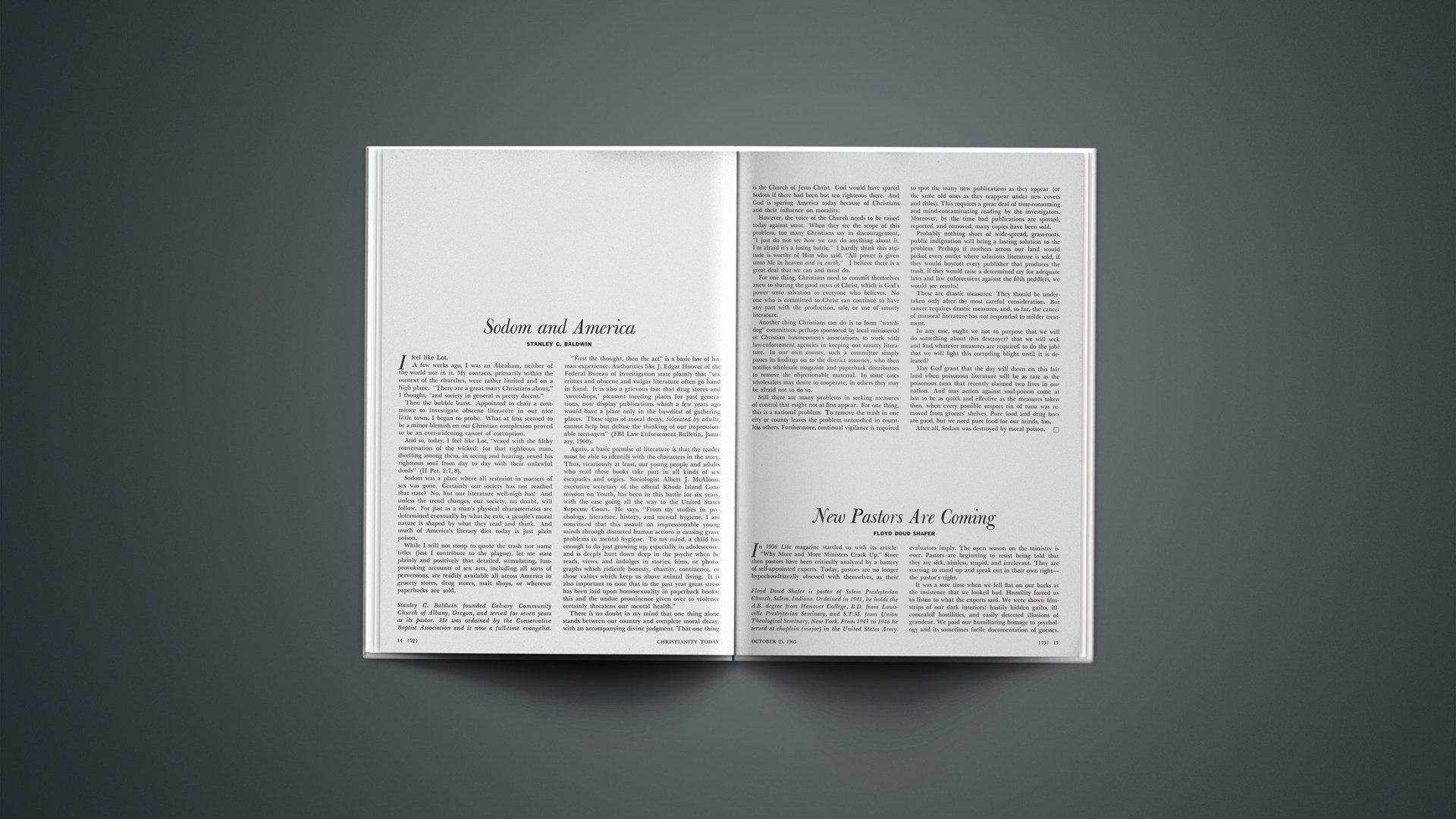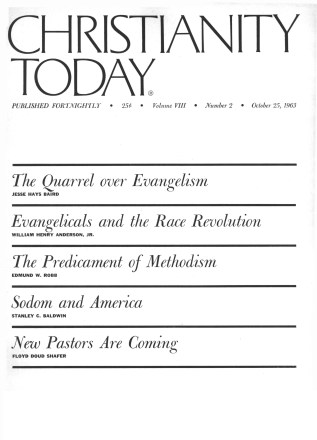I feel like Lot. A few weeks ago, I was an Abraham, neither of the world nor in it. My contacts, primarily within the context of the churches, were rather limited and on a high plane. “There are a great many Christians about,” I thought, “and society in general is pretty decent.” Then the bubble burst. Appointed to chair a committee to investigate obscene literature in our nice little town, I began to probe. What at first seemed to be a minor blemish on our Christian complexion proved to be an ever-widening cancer of corruption.
And so, today, I feel like Lot, “vexed with the filthy conversation of the wicked: for that righteous man, dwelling among them, in seeing and hearing, vexed his righteous soul from day to day with their unlawful deeds” (2 Pet. 2:7, 8).
Sodom was a place where all restraint in matters of sex was gone. Certainly our society has not reached that state? No, but our literature well-nigh has! And unless the trend changes, our society, no doubt, will follow. For just as a man’s physical characteristics are determined eventually by what he eats, a people’s moral nature is shaped by what they read and think. And much of America’s literary diet today is just plain poison.
While I will not stoop to quote the trash nor name titles (lest I contribute to the plague), let me state plainly and positively that detailed, stimulating, lust-provoking accounts of sex acts, including all sorts of perversions, are readily available all across America in grocery stores, drug stores, malt shops, or wherever paperbacks are sold.
“First the thought, then the act” is a basic law of human experience. Authorities like J. Edgar Hoover of the Federal Bureau of Investigation state plainly that “sex crimes and obscene and vulgar literature often go hand in hand. It is also a grievous fact that drug stores and ‘sweetshops,’ pleasant meeting places for past generations, now display publications which a few years ago would have a place only in the bawdiest of gathering places. These signs of moral decay, tolerated by adults, cannot help but debase the thinking of our impressionable teen-agers” (FBI Law Enforcement Bulletin, January, 1960).
Again, a basic premise of literature is that the reader must be able to identify with the characters in the story. Thus, vicariously at least, our young people and adults who read these books take part in all kinds of sex escapades and orgies. Sociologist Albert J. McAloon, executive secretary of the official Rhode Island Commission on Youth, has been in this battle for six years, with the case going all the way to the United States Supreme Court. He says, “From my studies in psychology, literature, history, and mental hygiene, I am convinced that this assault on impressionable young minds through distorted human actions is causing grave problems in mental hygiene. To my mind, a child has enough to do just growing up, especially in adolescence, and is deeply hurt down deep in the psyche when he reads, views, and indulges in stories, films, or photographs which ridicule honesty, chastity, continence, or those values which keep us above animal living. It is also important to note that in the past year great stress has been laid upon homosexuality in paperback books; this and the undue prominence given over to violence certainly threatens our mental health.”
There is no doubt in my mind that one thing alone stands between our country and complete moral decay, with an accompanying divine judgment. That one thing is the Church of Jesus Christ. God would have spared Sodom if there had been but ten righteous there. And God is sparing America today because of Christians and their influence on morality.
However, the voice of the Church needs to be raised today against smut. When they see the scope of this problem, too many Christians say in discouragement, “I just do not see how we can do anything about it. I’m afraid it’s a losing battle.” I hardly think this attitude is worthy of Him who said, “All power is given unto Me in heaven and in earth.” I believe there is a great deal that we can and must do.
For one thing, Christians need to commit themselves anew to sharing the good news of Christ, which is God’s power unto salvation to everyone who believes. No one who is committed to Christ can continue to have any part with the production, sale, or use of smutty literature.
Another thing Christians can do is to form “watchdog” committees, perhaps sponsored by local ministerial or Christian businessmen’s associations, to work with law-enforcement agencies in keeping out smutty literature. In our own county, such a committee simply passes its findings on to the district attorney, who then notifies wholesale magazine and paperback distributors to remove the objectionable material. In some cases wholesalers may desire to cooperate; in others they may be afraid not to do so.
Still there are many problems in seeking measures of control that might not at first appear. For one thing, this is a national problem. To remove the trash in one city or county leaves the problem untouched in countless others. Furthermore, continual vigilance is required to spot the many new publications as they appear (or the same old ones as they reappear under new covers and titles). This requires a great deal of time-consuming and mind-contaminating reading by the investigators. Moreover, by the time bad publications are spotted, reported, and removed, many copies have been sold.
Probably nothing short of wide-spread, grass-roots, public indignation will bring a lasting solution to the problem. Perhaps if mothers across our land would picket every outlet where salacious literature is sold, if they would boycott every publisher that produces the trash, if they would raise a determined cry for adequate laws and law enforcement against the filth peddlers, we would see results!
These are drastic measures. They should be undertaken only after the most careful consideration. But cancer requires drastic measures, and, so far, the cancer of immoral literature has not responded to milder treatment.
In any case, ought we not to purpose that we will do something about this destroyer? that we will seek and find whatever measures are required to do the job? that we will fight this corroding blight until it is defeated?
May God grant that the day will dawn on this fair land when poisonous literature will be as rare as the poisonous tuna that recently claimed two lives in our nation. And may action against soul-poison come at last to be as quick and effective as the measures taken then, when every possible suspect tin of tuna was removed from grocers’ shelves. Pure food and drug laws are good, but we need pure food for our minds, too.
After all, Sodom was destroyed by moral poison.
Stanley C. Baldwin founded Calvary Community Church of Albany, Oregon, and served for seven years as its pastor. He was ordained by the Conservative Baptist Association and is now a full-time evangelist.










